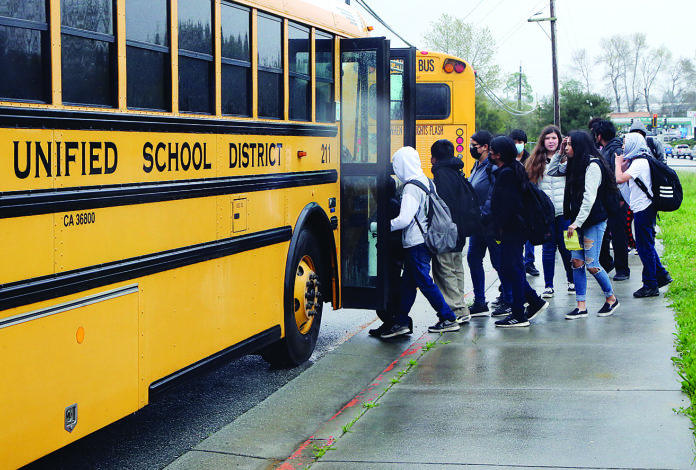
With election day approaching, voters have several state propositions from which to choose. Below is a brief description of each of them. For a deeper dive, visit voterguide.sos.ca.gov/propositions.
Public School and Community College Facilities
Under Prop. 2, the state would sell a $10 billion bond for public school and community college facilities for new construction and renovation projects.
Of this, $8.5 billion would be used for public schools, while $1.5 billion would go to community colleges.
Also allows school districts to receive extra funding for new classrooms, to renovate existing ones for transitional kindergarten or to build new gymnasiums, multipurpose rooms, libraries or school kitchens.
School districts would apply for the funds on a first-come, first-served basis, and career technical education and charter school funds through a competitive application process.
In addition, $115 million would be used for reducing lead levels in water at public school sites.
State officials say the bond would cost about $500 million annually over 35 years, in addition to10% interest, all of which would come out of the state’s general fund.
Constitutional right to marriage
In 2008, Californians passed Proposition 8, which limited marriage to one man and one woman and effectively banned same-sex marriage.
Two years later, a federal judge ruled that law unconstitutional, and when the United States Supreme Court declined to overturn that decision in 2013, it made same-sex marriage the law of the land.
But Prop. 8 remains still on the books. Prop. 3 would change the language in the California Constitution to allow everyone the right to marry.
New Bond for Natural Resources and Climate Activities.
Allows the state to sell a $10 billion bond for natural resources and climate activities.
Much of the bond money would be used for loans and grants to local governments, Native American tribes, not-for-profit organizations, and businesses. Some bond money also would be available for state agencies to spend on state-run activities.
This includes $3.8 billion for drought, flood and water supply projects, $1.5 billion for forest health and wildfire prevention, $1.2 billion for sea-level rise projects and $1.2 billion for land conservation and habitat restoration. $700 million would go toward parks, and farms and agriculture would be eligible for $300 million.
Would cost roughly $400 million annually for 40 years, including 10% interest, which would come from the state’s general fund.
Lowering the threshold for bonds
Currently, many local bonds require a two-thirds majority vote to pass. This law would lower that threshold for bonds funding affordable housing and public infrastructure projects to 55 percent.
The law would also require local governments implementing those bonds to conduct annual independent financial and performance audits, and appoint citizens’ oversight committees.
Bans involuntary servitude for state prison inmates
Would change the state constitution to ban involuntary servitude as a punishment for crime, and stop state prisons from disciplining people who refuse to work.
Increasing minimum wage
Sets minimum wage in 2025 for employers with 26 or more employees at $18 per hour, and those with fewer at $17 per hour.
In 2026, the minimum wage would be $18 per hour for all employees.
The minimum wage would be adjusted for inflation every year beginning in 2027.
Rent control
This law would allow local governments to expand rent control rules by eliminating the Costa-Hawkins Rental Housing Act. That law aimed to balance the interests of landlords and tenants by limiting the ability of jurisdiction to control rent increases.
Supporters say the new law would help renters in a challenging housing market.
But opponents warn that “rent control” includes inclusionary housing requirements for low-income housing projects. If jurisdictions are able to set their own requirements, setting the number of required low-income units too high, for example, developers may be wary of creating new projects because they won’t pencil out financially.
In addition, the value of rental housing would decline because potential buyers would not want to pay as much.
The law could also decrease the number of available rental units because landlords would seek to sell their properties to permanent owners, opponents say.
Similar measures were defeated in 2018 and 2020. All three were forwarded by the Los Angeles-based AIDS Healthcare Foundation, known among other things for seeking to block new housing projects there.
Requirements for Medi-Cal Prescription funds
Under federal law, the 340B program requires pharmaceutical companies to sell their drugs to nonprofits at discounted rates. Those nonprofits then charge insurance companies full price, and keep the remainder for patient services.
One of those groups is the AIDS Healthcare Foundation, which used some of those proceeds for housing projects and legislation that supports it. This includes Prop. 33.
Prop. 34 would require nonprofits that meet a very specific set of criteria to use 98% of those proceeds for direct patient care. But opponents say that those criteria are so narrow that it appears targeted specifically at the AIDS Healthcare Foundation.
Some opponents, in fact, call Prop 34 “The revenge initiative,” for that organization’s support of Prop. 33.
Make the Managed Care Organization Provider Tax permanent
Since 2009, the state has charged a tax on certain health care plans, called the Managed Care Organization Provider Tax. This is estimated to bring in between $7 billion to $8 billion every year, which is used to fund Medi-Cal, the state-federal health program for low-income people.
State officials say this helps allay that program’s costs, as Medi-Cal costs roughly $35 billion from the state’s general fund this year.
This tax is set to expire at the end of 2026. Prop. 35 would make the tax permanent beginning in 2027.
There was no opposition filed to this proposition.
Increases charges and sentences for drug and theft crimes
In 2014, voters approved Proposition 47, which reduced the penalties for some drug and theft charges.
While supporters saw that law as a way to ease overly strict consequences for crimes, Prop. 36 supporters say it resulted in an “explosion in crime” and in the proliferation of hard drugs such as Fentanyl.
Prop. 36 would increase theft of $950 or more from a misdemeanor to a felony if the perpetrator has previous convictions.
It would also lengthen prison sentences for theft or damage of property if three or more people committed the crime together.
In addition, crimes involving “hard” drugs such as fentanyl, heroin, cocaine, or methamphetamine would require prison time.
WHERE TO VOTE
With mail-in ballots sent out by the Santa Cruz County clerk last week, early voting for the November 5th election has begun.
Included in the mail-in voting kits are a sample ballot, an official ballot and a voter guide. There are 22 ballot drop box locations across the county where you can leave your ballot if you don’t want to mail it.
Aptos
Aptos Branch Library, 7695 Soquel Dr.
Polo Grounds near the dog park, 2255 Huntington Dr.
Cabrillo College Parking lot R by the stadium, 2372 Cabrillo College Dr.
Capitola
420 Capitola Ave. in the City Hall parking lot
Mall near the old Sears, 1855 41st Ave.
Public Library, 2005 Wharf Rd.
Corralitos
Corralitos Women’s Club, 33 Browns Valley Rd.
Davenport – Fire Station, 75 Marine View Ave
Santa Cruz Mountains
Highlands Park, 8500 Highway 9, Ben Lomond
Boulder Creek Community Church – 12465 CA-9, Boulder Creek
Covered Bridge Park – at Mt. Hermon and Graham Hill Rd., Felton
Summit Store, 24197 Summit Rd., Los Gatos
Santa Cruz
701 Ocean St. in front of the County Government Center
Sheriff’s Crisis Center – 5300 Soquel Ave.
212 Church St. in the public parking lot
UCSC Quarry Plaza
Trescony Park, end of Trescony St
Scotts Valley
1 Civic Center Dr. in the City Hall parking lot
Watsonville
316 Rodriguez St. in the municipal public parking lot 14
County Health Center, 1430 Freedom Blvd.
County Building at Westridge, 500 Westridge Dr, Watsonville
Additionally, early voting centers opened October 7th, Monday through Friday, 8 am to 5 pm across the county at the following locations:
● Santa Cruz – Santa Cruz County Clerk/Elections, 701 Ocean St., Room 310
● Watsonville – Watsonville City Clerk’s Office, 275 Main St., 4th Floor
● Watsonville – Westridge County Building, 500 Westridge Dr, Watsonville, CA 95076
Due to Santa Cruz’s status as a vote center county, you can cast your vote at any of the 24 locations open from November 1st to 5th listed on a map at www.votescount.gov, meaning you don’t have to go to a specific site to cast your ballot.
With online registration closing on October 21st, the deadline to register is closing in. However, if you are unable to do so, you can register on or before election day at any of the previously listed polling sites by filling out a yellow same-day registration form.
If you are a student at UCSC and received a ballot from your home county anywhere across the State, you can drop it off at any Santa Cruz drop box and it will be safely transported to where it’s county of origin.
As concerns over voter fraud have increased in recent years, the voter hotline remains open at 800. 345.8683, Where any questions you might have will be answered.










